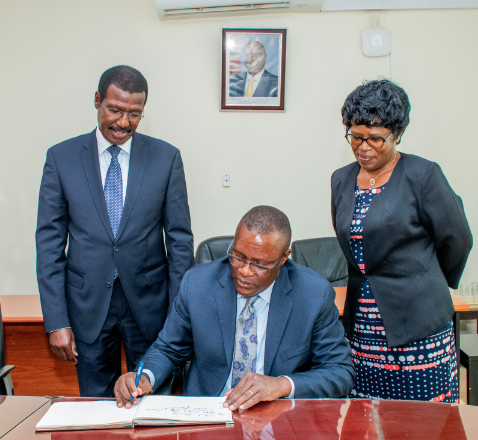 Deputy Chief of Staff for Performance and Delivery
Management Eliud Owalo signs documents as KU Council chair Dr. Ben Chumo and
acting VC Prof. Waceke Wanjohi/HANDOUT
Deputy Chief of Staff for Performance and Delivery
Management Eliud Owalo signs documents as KU Council chair Dr. Ben Chumo and
acting VC Prof. Waceke Wanjohi/HANDOUTKenyatta University (KU) has started a performance evaluation process for the 2023-2024 fiscal year in its efforts to enhance service delivery.
The evaluation is a pivotal moment in the university's ongoing commitment to excellence in education, research, and community service.
The performance evaluation will assess student completion
rates, academic programmes, student mentorship, Ph.D. enrollment among staff,
intellectual property registration, commercialisation of innovations,
dissemination of research outputs, community outreach, and the development of
an institutional repository.
The overarching goal is to identify gaps and propose strategies to address any challenges, ensuring continuous improvement and alignment with both local and international educational standards.
Chairperson of the University Council, Dr. Ben Chumo, and acting Vice Chancellor, Prof. Waceke Wanjohi, lead the evaluation team.
Both leaders underscored the importance of this evaluation in guiding KU’s future trajectory.
Chumo emphasised the necessity of regularly assessing the university's performance to ensure that it stays responsive to evolving educational needs.
"This process is essential for assessing our progress and identifying areas where we can amplify our impact," Chumo said.
Wanjohi highlighted that the university’s sustained growth and success are intricately linked to national priorities and the continually evolving education standards.
She further stressed that the outcome of this evaluation will be crucial in shaping KU's academic and operational strategies moving forward.
The Deputy Chief of Staff for Performance and Delivery Management, Eliud Owalo, who led the exercise, emphasised the importance of performance evaluations in public institutions.
Owalo pointed out that public institutions such as KU must align their performance with Kenya's Vision 2030 and the Bottom-Up Economic Transformation Agenda (BETA).
"This process is key to holding institutions accountable and ensuring they fulfill their responsibilities," Owalo said.
He emphasised that the findings from this evaluation will be vital in informing KU’s plans and ensuring its active participation in national development and global competitiveness.
Student graduation rates remain a key priority for KU, the institution said. The university administration said it has been working on initiatives such as financial aid improvements, academic mentorship, and enhanced student support services to increase the completion rate.
KU’s ongoing review of its academic programmes aims to ensure they remain relevant, rigorous, and aligned with both local and international market demands.
This includes revising outdated curricula and introducing new interdisciplinary courses that cater to the evolving job market.










